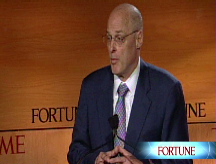Congress wants answers on bailout
House panel will hear testimony from Treasury, key bailout oversight administrators on government's handling of funds.
NEW YORK (CNNMoney.com) -- Before Congress put the Treasury Department in charge of $700 billion of financial rescue funds, it mandated several stringent measures to ensure the money would be used for its intended purpose.
Six weeks later, Treasury is coming under increasing fire on Capitol Hill for how it is implementing the Troubled Asset Relief Program.
Next up, the House Financial Services Committee will hear testimony on Wednesday from bailout point man Neel Kashkari, Acting Comptroller General Gene Dodaro and two members of a congressional oversight panel: Harvard law professor Elizabeth Warren and Rep. Jeb Hensarling, R-Texas.
The hearing will serve as a follow-up to a Government Accountability Office report delivered to Congress last week and a Congressional Oversight Panel review set to be delivered to lawmakers Wednesday. On Monday, the Senate confirmed a former federal prosecutor, Neil Barofsky, whose job it will be to ensure that the program is not tainted by corruption.
The Wall Street Journal reported on its Web site on Tuesday that the yet-to-be-released oversight panel report will harshly criticize Treasury's lack of accountability and clear direction for its bailout program.
Similarly, the GAO report said Treasury has yet to address "critical" oversight issues to ensure the plan is working. The study found that the Treasury program needs more staff, better management, an improved transition effort and facilities to ensure banks are using bailout funds effectively.
Lawmakers on both sides of the aisle used the report as a launching pad for criticism of the Treasury's handling of the bailout so far.
Democrats, including House Speaker Nancy Pelosi, D-Calif., Senate Banking Committee Chairman Christopher Dodd, D-Conn., and House Financial Services Committee Chairman Barney Frank, D-Mass., focused their ire on the lack of Treasury's commitment to foreclosure reduction and troubled homeowner assistance.
"Adding this blatant refusal to enforce any lending obligations on individual intuitions the continued policy of ignoring the clear intent of the EESA to aid in the reduction of foreclosures put the Treasury perilously close to a breach faith with those who responded to the Bush Administration's request to establish the program," said Frank in a statement.
Republican House leaders, including Minority Leader John Boehner, R-Ohio, lambasted Paulson for shifting strategies from mortgage-backed securities purchases to capital investments. They said Treasury needs a clear outline for use of the funds before lawmakers will hand out the remaining balance.
"Such opaqueness is unacceptable, particularly if it is your intention to ask Congress to release the remaining $350 billion in taxpayer funds that were conditionally authorized by Congress this fall," Republican congressional leaders in a statement.
With just $15 billion of the first $350 billion of Troubled Asset Relief Program funds left unallocated, some political analysts expect Secretary of the Treasury Henry Paulson to ask for the second half of the $700 billion bailout.
But to get the remaining balance, Paulson will have to convince Congress the financial sector needs it -- and that the Treasury will use the funds appropriately. That may be difficult with the increasing criticism the Treasury has faced from lawmakers.
After the Emergency Economic Stabilization Act was signed into law Oct. 3, Paulson immediately received $250 billion with which to work. The next $100 billion came on Oct. 14, when President Bush asked Congress for the next batch of funding.
Thus far, the bulk of the first $350 billion has been allocated for capital investments in banks. Of the $250 billion allocated, the Treasury has sent out more than $161 billion in checks to 52 banks in exchange for preferred shares and a high dividend.
Treasury has also sent $40 billion to AIG as part of the insurer's $152 billion bailout, allocated $20 billion for an additional capital investment in Citigroup and set aside $20 billion to backstop losses from a separate Federal Reserve plan to buy up debt backed by consumer loans.
That leaves little leeway left to help avert disaster, as Treasury did with Citigroup's second emergency loan a week before Thanksgiving. ![]()



